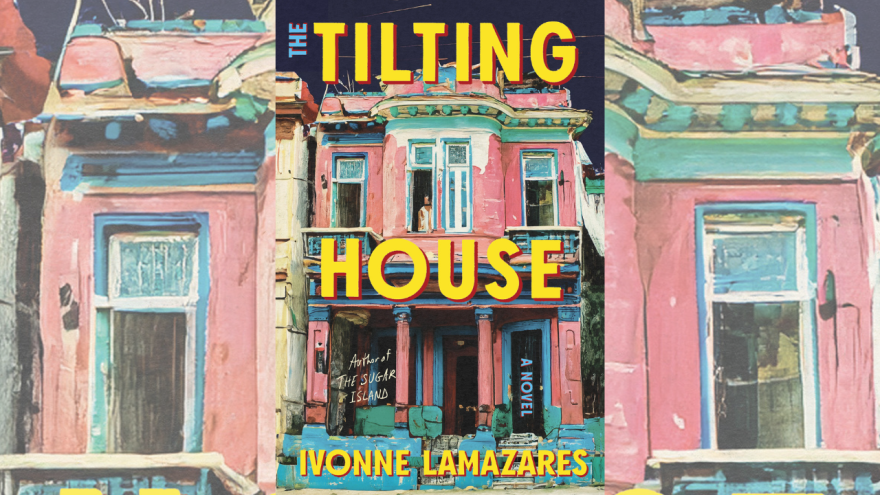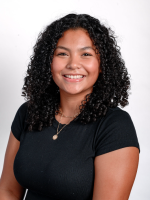In The Tilting House, Cuban‑American author Ivonne Lamazares tells the story of Yuri, a teenage girl growing up in 1990s Havana, Cuba.
In 1993, Yuri meets Mariela, a Cuban‑American artist who claims to be her sister — separated from them all these years by familial and political turmoil.
Spanning decades, the novel explores the losses and gains of migration, the hunger for belonging, and unearthing family secrets.
WLRN "All Things Considered" Host Helen Acevedo spoke with Lamazares ahead of the book's release.
The interview has been edited for brevity and clarity.
What inspired your book, The Tilting House?
LAMAZARES: It was very interesting because I was thinking about writing a second novel, but I had tried. Very different beginnings to it. And I was struggling thinking, oh God, you know, I don't wanna write again from the perspective of a teenager, you know, which I did for my first novel, The Sugar Island.
Then I came across this blog of a Cuban American writer who said that she was going back to Cuba to live there. And I said, oh. That's, that's different. You know, we don't hear normally that kind of trajectory in the Cuban exodus give the political and, and the economic conditions on the island. So, but the idea just wouldn't leave me.
I just kept thinking and thinking about it, and it raised a number of questions for me. One of them being like, what does that person seek in returning and can one return to one's? Origins And so the character Mariela, one of the sisters in the story of the tilting house came to me and I began to see her as an artist.
And I began to see her as someone with a great hunger for belonging and for finding her homeland and even her mother.
WLRN: How long have you been working on The Tilting House?
This book had many iterations before I actually settled on this one. So I would say that it took me at least 10 years. I was also teaching full-time, so I guess I'll, I'll give that as an excuse, but in reality, um, it's also because my process is kind of unusual.
You know, I have to write longhand and I write from one word to the next. I don't really plan or have any outlines because I have realized that if I do that I am not surprised. I am not discovering and things come out dead on the page. So it took, it took forever for me kind of work out this novel. And also I was really stuck at one point.
So I finally decided to return to visit Havana. I thought, Hey, my characters are doing this, so I gotta do it myself. So I went back and it was then that I found the key to the end of the book. And part of the, the, the big experience that I had going back to Havana was visiting my mother's grave as an adult and finally being able to grieve her. [To] fully to express that childhood grief that I had not expressed.

And also just revisiting the places. And I saw some of my friends from childhood and I saw one in particular. We had attended the same church and I had this memory of her being I. I, she was being humiliated a little bit because she had a boyfriend.
The Sunday school teachers didn't like her being, you know, kissing around with the boyfriend in the, in the hallways, in, in the church and so on. And I remember this. So I saw her again and I said, Hey, Miriam, you remember this? And Miriam said, no, I don't remember that. I said, are you kidding me? I've been holding this memory for all this time because I was so angry that they had done that to you.
And she said, oh, well, you must have wanted justice. And I thought, oh, that's the key to finishing the book. Yuri wants justice. She wants to figure out, um, how to give justice to herself, to other people, to her sister Mariella for the disruption and, and the destruction of the world that she knew were other parts of the story inspired by your own life.
READ MORE: Poet Aja Monet's 'Florida Water' reflects on art, activism and spiritual connection to Florida
Neither novel that I have written, is really autobiographical in terms of the events, but it's very emotionally autobiographical. I migrated from Cuba at the age of 13. Um, so I was a teenager like Yuri, the narrator of the story, and I experienced two core, I think two core experiences that are explored in the tilting house.
So my mother died when I was three years old in Cuba. Cancer. And, um, that was very, um, obviously it, it just formed my entire identity for a long, long time in my own head. Whenever somebody would say who are you? I would, I would probably wanna answer, I'm Ivan La Ma, and my mother died when I was three.
That just seemed like the core, um, fact of, of my life. But my grandparents who raised me with a lot of love and care and attention, they didn't think that I actually had grief. They felt that because I didn't remember my mother, I really wasn't suffering. And maybe that was a way for them to console themselves.
I'm not sure, but. Bottom line is that I did, I did have a lot of grief as Yuri calls. It impacted grief, you know, as she wasn't able to really come to terms with it and neither was I until I was an adult. So that is certainly an emotional journey that I went through. And Yuri does too.
How does Cuba and Miami inspire or shape your work overall?
I write about two things, family relationships that are complicated, and it appears that I write only about the context of migration. I think that's why I have to begin with a teenager in my stories because that's when I migrated. I think in this book in particular, I was thinking about how does one integrate one's past as an immigrant.
How does one relate to the place of origin, to the country of origin, to the people that are still living there? Um, and within ourselves. If our experiences were maybe of trauma of loss or like so many newcomers to our country experiences of violence, of privation, of oppression, um, how does one integrate that?
How does one pick up those pieces while one is also reinventing? Oneself and creating new connections.
You touched on a couple of historical points in the book from Operation Pedro Pan to the Mariel Boat Lift. What kind of research went into making sure you were accurately depicting the time and creatively forming these characters?
I read a lot of books. I saw films, but I met people also. That's, that's the great privilege of living in Miami, is you meet adults who had gone through the process of, of Perro Pan, and there's just a huge diversity of opinions and of emotions. That, as we can imagine, that went into an exodus like that, some of their, their anecdotes just sparked a lot of different incidents that I put in the novel
With The Tilting House's release, what are you most excited or nervous about?
Nervous about everything, but I, I'm finally very excited to see this novel be in the hands of readers. You know, the magic of fiction is that it puts us in the mind and in the heart of someone that perhaps we are very different from. But there's, there's sometimes a spark of recognition, you know, oh, I've gone through that and I think this is.
Ultimately a universal quest in life. You know how to deal with our past, how to integrate our past selves with our present selves, and how to heal from that and end up as compassionate people. I wanted to portray immigrants. As full complicated human beings, you know, because sometimes even well-meaning folks think of immigration as only a forward trajectory.
Sometimes we think of immigrants only as sort of blank slates. You know, they come here and then they just have to forget everything that they ever were and, um, and become us, whatever that means. And especially in this climate. Of such negative stereotypes being depicted of immigrants, I just hope that the tilting House gives readers this feeling of just full and complete and contradictory, and full of longing human beings.
Lamazares' book is set to release on July 22. For more information, click here.
Keep up with South Florida's arts and culture scene by signing up for The A/C Newsletter. Every Wednesday, the A/C will offer a curation of stories and deep dives that celebrate South Florida's arts community. Click here to subscribe.






